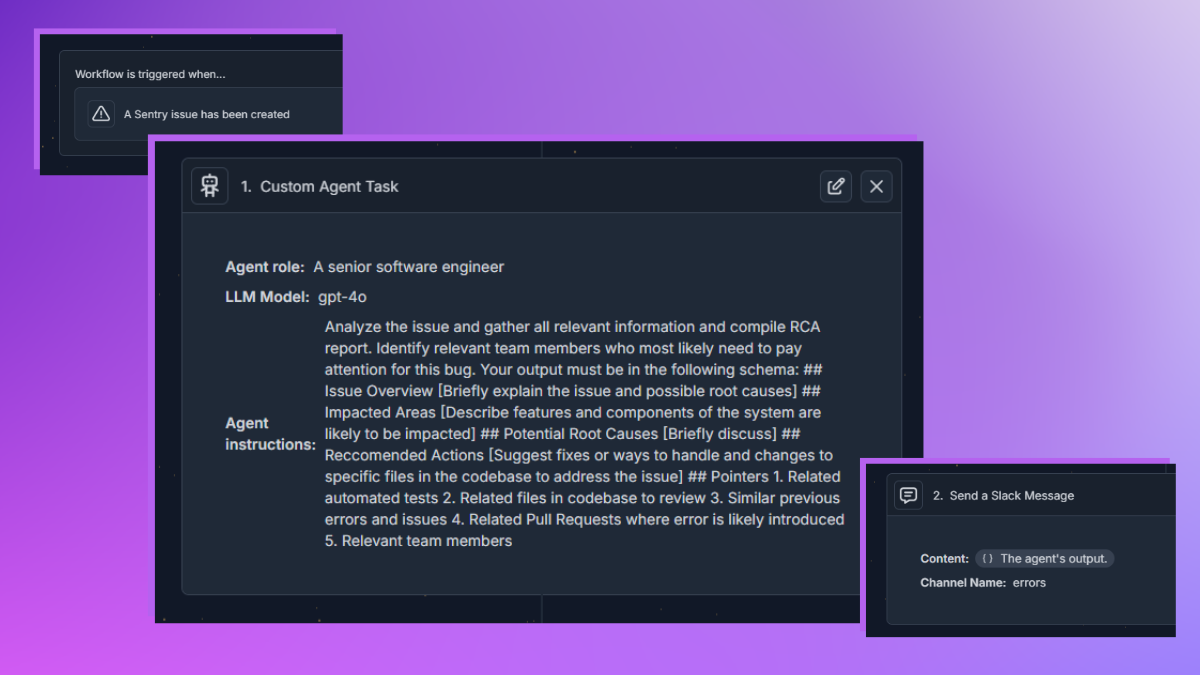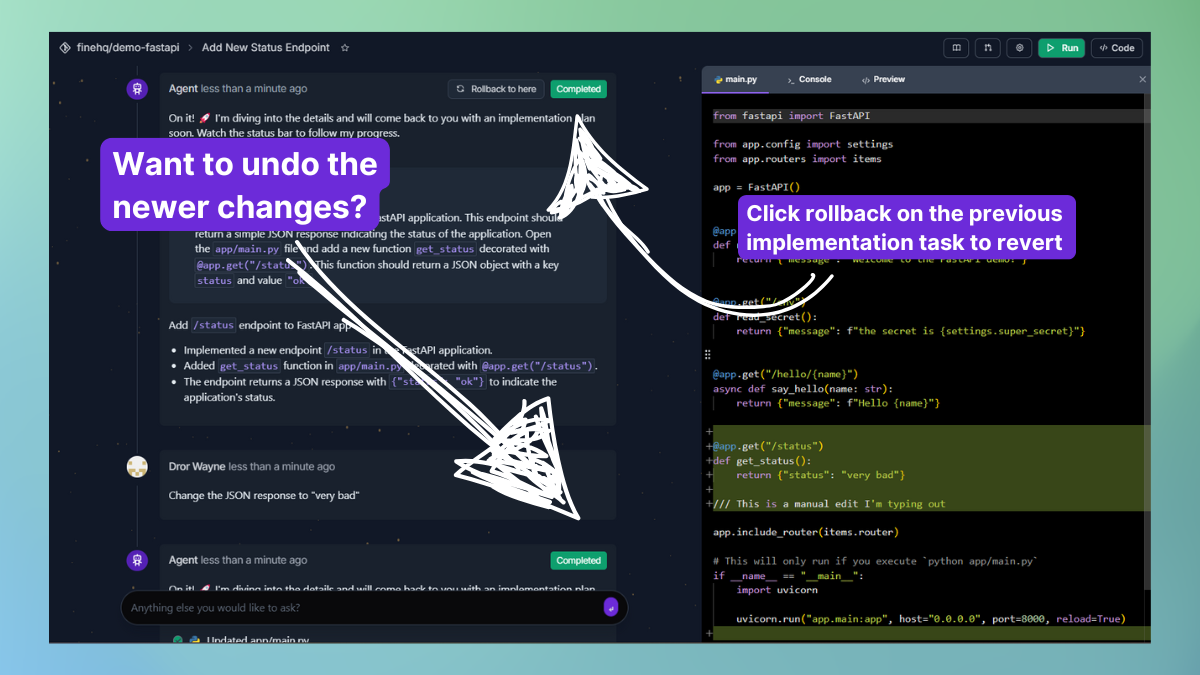AI for Programmers: Trends and Predictions
AI is flipping the script on programming, changing the way you write, test, and deploy code. Forget those boring workflows—AI is here to make development faster, more efficient, and, dare we say, a bit more fun. The hype around "AI for programmers" is real, and it's pushing the limits of what you can achieve. So buckle up as we dive into the latest AI trends and what the future has in store for you.
1. Current Role of AI in Programming
AI is already deeply integrated into programming, supporting developers in numerous ways:
- AI Code Assistants: Many programmers are using AI assistants to help write code. These range from basic tools that auto-complete text to [full-fledged platforms like Fine that can perform a variety of tasks with you, such as answering questions about your codebase and making revisions in PRs]. )
- Automated Bug Detection: AI-driven tools are identifying and highlighting bugs, helping developers maintain higher code quality. Tools like Sentry are used to monitor software and catch bugs, and can be used as context for AI agents such as Fine.
- AI-Driven Testing and Code Review: AI assists in automated testing and reviewing code, ensuring consistency and reducing manual errors.
- Natural Language-Based Coding: AI tools like Fine.dev make coding more accessible by allowing developers to write code using plain language descriptions.

2. Emerging Trends in AI for Programming
AI is evolving rapidly, and new trends are emerging that are reshaping the development field:
- Collaborative AI Coding: AI tools like Fine are enabling collaborative workflows where developers and AI work asynchronously on tasks, rather than just pair programming. Fine's experience is based on working with another human developer - however you usually interact and collaborate, you can work with Fine.
- AI in Code Optimization: AI tools are being used to optimize code, improving performance, efficiency, and scalability of existing codebases.
- AI in Low-Code/No-Code Platforms: AI is making low-code and no-code platforms even more powerful, helping people without deep technical knowledge to build apps more easily. This is making the work of professional developers even more important - in a world where anyone can build a simple application, only truly high-quality software is in demand.
- Natural Language Programming: AI tools for programmers allow developers to describe their desired functionality in natural language, and the AI generates the corresponding code, making development more intuitive. This is also known as specs-driven development and we expect it will be the way most code is written in 2030.
- AI-Driven Continuous Integration/Continuous Deployment (CI/CD): AI agents are optimizing CI/CD pipelines, speeding up software delivery and reducing human intervention in routine processes.

3. Predictions for the Future of AI in Programming
Looking ahead, we can make several predictions about how AI will shape the future of programming:
- The Evolution of AI Code Assistants: AI will become a key part of every step in the software development lifecycle, from initial concept to production. Tools like Finewill help developers seamlessly navigate these stages.
- Shift Towards AI-First Development: The future might see developers starting projects with AI-generated code skeletons, acting as supervisors who guide, refine, and add complex logic where needed.
- Personalized AI Agents: AI agents, like those in Fine, will learn from individual developers' or teams' coding styles, enabling them to make more accurate suggestions and complete tasks with greater efficiency.
- Ethics and Responsibility: As AI becomes more powerful, understanding ethical concerns and how AI models make decisions will be crucial for developers. Bias in AI outputs must be mitigated through careful consideration and monitoring.
- AI for Learning and Upskilling: AI will play a significant role in helping developers learn new skills, providing real-time, interactive feedback and personalized learning experiences.

4. Challenges and Considerations
With AI becoming more prominent in programming, developers and the industry need to address several challenges:
- Reliance on AI: Over-reliance on AI tools might result in developers losing their fundamental coding skills. It's essential to strike a balance between leveraging AI and maintaining core competencies.
- Bias in AI Models: AI models can carry biases from the data they are trained on, leading to unethical or unfair code suggestions. Developers must be vigilant and responsible when using AI tools.
- Data Privacy and Security: Trusting AI with proprietary or sensitive code can present security risks. Developers must ensure AI tools are secure and compliant with privacy regulations.
5. How Developers Can Prepare for the Future
To thrive in a world where AI is a significant part of programming, developers should consider the following steps:
- Learn to Collaborate with AI: Embrace tools like Fine and learn how to work with AI as a partner, using its strengths to enhance productivity. The best developers, working with the best AI tools, will deliver the best results. Practice communicating clear, detailed requirements.
- Focus on Problem Solving and Design: While AI can handle repetitive and mundane coding tasks, human creativity, problem-solving, and design are irreplaceable skills that developers should hone.
- Stay Informed: Keep up with advancements in AI-driven programming by reading blogs, taking courses, and experimenting with the latest AI tools like Fine.dev.
Conclusion
AI is undoubtedly transforming the programming world, but rather than replacing developers, it is evolving their roles. AI tools like Fine are making coding more efficient, helping developers focus on creative problem-solving while automating routine tasks. The future of programming is collaborative, and those who embrace AI will be well-positioned to lead the industry.
Ready to experience the future of programming? Sign up for Fine today and discover how AI can streamline your coding processes, boost your productivity, and prepare you for the future of programming.
